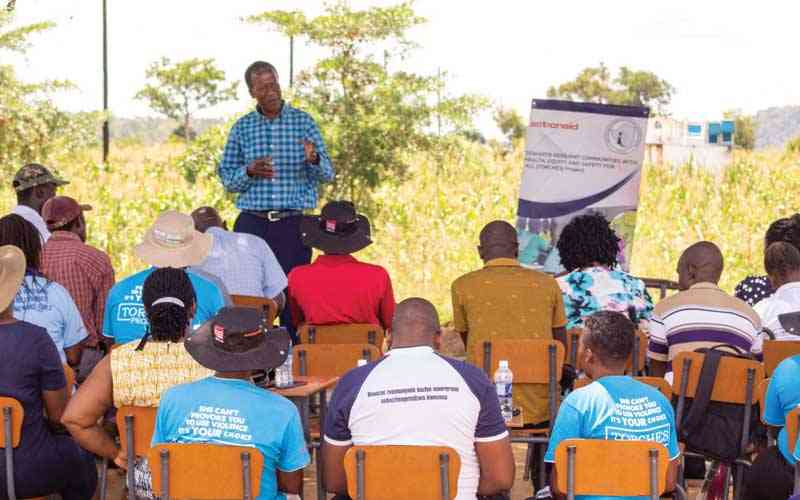
THE promotion of inclusive education in Zimbabwe and the sensitization of disability inclusion issues in GBV programming is an important aspect of creating an inclusive community. Leonard Cheshire Disability Zimbabwe (LCDZ) is one organisation that is at the forefront of advocating for the inclusion of persons with disabilities (PwDs) in community initiatives and programs.
The organisation has its roots in the UK, it started its operations in Zimbabwe in 1981 and has been a consistent campaigner for the removal of barriers that hinder Persons with disabilities (PwDs). It is headquartered in Harare and is affiliated with the Leonard Cheshire Disability Global Alliance operating in 54 countries across the globe.
The non-profit making disability service organisation is a consortium partner in the Towards Resilient Communities with Health, Equity and Safety (TORCHES) project whose primary goal is to foster safer and more equitable communities by empowering women and girls including persons with disabilities.
Spearheaded by Action Aid Zimbabwe (AAZ) through the Zimbabwe chapter of the Forum for African Women Educationalists (FAWEZI) who have partnered with Family Caring Trust Zimbabwe (FACT) and LCDZ who are playing an instrumental role in identifying and ensuring the participation of children with disabilities in community programs implemented by Fawezi and Fact in Nyanga, Chitungwiza and Shamva.
Their engagement in the TORCHES project is through the SASA! Together concept, which is a four-phased community-oriented program that was rolled out by Fawezi. It focuses on addressing and preventing violence against women and girls through open dialogues, awareness campaigns, support for survivors, and collective community action.
Recently FAWEZI together with its partners, concluded three close-out workshops in Chitungwiza and Shamva as a way of evaluating the successes and challenges recorded during the TORCHES project last year when its community project implementers engaged with residents in wards 10 and 18 in Zengeza and Shamva district.
Martin James the project officer at LCDZ told Standard Style that they are always active whenever these activities take place by making sure persons with disabilities participate fully including some of the community champions and community leaders who have disabilities. “We facilitate the assessment of PWDs at hospital rehabilitation units (physical assessment), eye units (visual acuity assessment), or by an educational psychologist (intellectual challenges for placements in special classes). These are then given assistive technology (if prescribed) by the TORCHES project,” he said.
“In schools, we are always present where Fawezi and Fact would have activated their Tuseme clubs. We make sure children with disabilities fully participate and have a quarter reserved for children with disabilities.”
- Organisation out to champion inclusivity programming
Keep Reading
‘Tuseme’ is a KiSwahili word meaning ‘let’s speak out’ and is one of the Fawezi models propelling the TORCHES project. It aims to empower young individuals, enabling them to confidently voice their opinions and concerns.
LCDZ currently works with fifteen schools in Nyanga, Shamva and Chitungwiza. In Chitungwiza the schools are: Chaminuka and Tafadzwa primary, Mhuriimwe secondary as well as Seke 5 and Seke 3 High. In Nyanga, the consortium works with both Mazarura Primary and secondary schools, Kanyimo Primary, Ruwangwe Secondary and Sanhani Primary, while in Shamva focus is on Wadzanai Primary and Secondary, Ming Chang, Madziwa Mine Secondary and Primary schools.
It also assesses children with hearing challenges and purchases assistive listening devices such as hearing aids. Teachers, pupils and those who have disabilities have received assistance in terms of technology. Primary schools that have special classes such as Chaminuka, Wadzanai and Madziwa have been given furniture. Another consignment of thirty desks is set to be delivered at Mazarura Primary School in Nyanga.
“We also train teachers at schools that have enrolled children who are deaf. We have also built disability-friendly toilets at two schools that had children who were recipients of wheelchairs from us. At some we have constructed pathways,” James said, adding that School Development Committees (SDCs) and school authorities have been sensitized on disability inclusion issues and encouraged to enrol children with disabilities. “Teachers have been trained on how to identify CWDS in their classrooms and how to handle them.”
Through the TORCHES project, LCDZ has over a period of three years provided wheelchairs, spectacles, crutches, surgical shoes and braces, water tanks, chairs, desks, sewing machines, tapped buckets, teacher's tables and chairs.
Following the closeout workshop held this past Wednesday at the Simuka Upenye Integrated Youth Academy Zimbabwe premises which was attended by Shamva residents from wards 16, 24 and 28, community advocates said that Tuseme clubs have been resurrected and that students who are able-bodied now accept students who live with disabilities, however, Tuseme mentors face challenges in terms of communicating with deaf people and there was an appeal for teachers to be taught sign language.
Through Tuseme clubs in the area, it was noted that there is now a reduction in bullying, school dropouts, teenage pregnancies and the abuse of drugs.
Similar to feedback from the first workshop in Chitungwiza there is now acceptance within the community in some sections of the communities of Shamva, especially among males who now acknowledge that domestic abuse is unacceptable.
Some of the successes noted are that there is now an understanding of referral pathways among women and girls.







